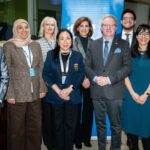
On 10 February 2024, the Permanent Mission of the State of Qatar to the United Nations, in collaboration with the UN Department of Economic and Social Affairs (UN DESA), the Doha International Family Institute (DIFI), and the International Federation for Family Development (IFFD), hosted the side event “From Commemoration to Action: The IYF+30 Way Forward” at the 63rd Session of the Commission for Social Development (CSocD63). This discussion aimed to advance the global conversation on family-oriented policies following the 30th Anniversary of the International Year of the Family (IYF+30).
HE Ambassador Alya Al Thani, Permanent Representative of the State of Qatar to the UN, opened the event by reaffirming the importance of placing families at the core of sustainable development policies.
Mr Charles Katoanga, the Director of the Division for Inclusive Social Development (DISD), provided an overview of UN DESA’s work on family policies. He outlined ongoing research and initiatives, including a comprehensive review of Voluntary National Reports (VNRs) from 2020 to 2024 to assess the role of family policies in achieving SDG targets.
Dr Sharifa Noaman Al Emadi, Executive Director of DIFI, stressed that the advocacy for family empowerment does not end with the 30th anniversary of IYF. Instead, this milestone serves as a launchpad for continued efforts to ensure that families remain central to policymaking and sustainable development goals.
Dr Alex Vázquez, Director of International Relations of the IFFD, underlined how the family is one of the most vital public goods in achieving social development. This belief has driven the IFFD’s unwavering commitment to the 30th Anniversary of the IYF and to approach the Second World Social Summit in a determined manner. IFFD reaffirmed its commitment to work with DIFI and other stakeholders to ensure families are at the centre of the global effort for social development.
The session also featured expert insights on four megatrends impacting families:
1. Technology and families – Addressing the opportunities and risks of digital transformation.
2. Demographic changes – Examining the implications of shifting population dynamics on family structures.
3. Urbanization and migration – Understanding how mobility trends affect family cohesion.
4. Climate change and families – Exploring how environmental challenges impact family stability and resilience.
Through this session, Qatar and its partners reaffirmed their commitment to advancing family policies as a cornerstone of sustainable development, advocating for inclusive, evidence-based, and forward-thinking solutions to strengthen families globally.









